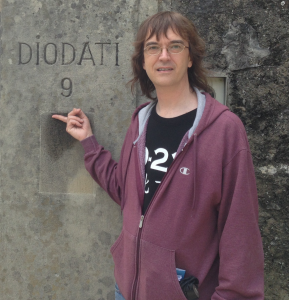 Dean Zimmerman is Professor of Philosophy at Rutgers University and Director of the Rutgers Center for Philosophy of Religion. We invited him to answer the question “What norms or values define excellent philosophy of religion? as part of our “Philosophers of Religion on Philosophy of Religion” series. More specifically, we asked, “In scientific inquiry, preference is given to theories exemplifying theoretical virtues like explanatory power, predictive accuracy, empirical adequacy, coherence with working theory, broad applicability, fruitfulness for further inquiry, and simplicity. Are these same theoretical virtues important in philosophy of religion?”
Dean Zimmerman is Professor of Philosophy at Rutgers University and Director of the Rutgers Center for Philosophy of Religion. We invited him to answer the question “What norms or values define excellent philosophy of religion? as part of our “Philosophers of Religion on Philosophy of Religion” series. More specifically, we asked, “In scientific inquiry, preference is given to theories exemplifying theoretical virtues like explanatory power, predictive accuracy, empirical adequacy, coherence with working theory, broad applicability, fruitfulness for further inquiry, and simplicity. Are these same theoretical virtues important in philosophy of religion?”
I begin with a not entirely irrelevant aside about the unfortunate label “analytic philosophy”: Today, philosophers flying under this flag can be idealists, materialists, empiricists, rationalists, you-name-it. They are united by no deep agreement about doctrines or methods. The best one can say about them is that they are united by their attitude to the two sides of the debate which generated the label “analytic”.
“The philosophy of analysis” was used to refer to the realist metaphysics and epistemology of Russell and Moore, who were opposed to the holistic idealists like Bradley and Bosanquet. The latter thought you could not analyze a fact into its components; every attempt led to something false; Moore and Russell denied this, and attacked the arguments idealists typically gave for it. Moore and Russell wrote clearly, they were extremely careful about making distinctions between different things one might mean by this or that word, they deeply valued logic and strove to display the logical validity of their arguments. More generally, they cared about the theoretical virtues mentioned above in the description of the scientific method – clarity, coherence, simplicity, scope, that sort of thing. The most famous British idealists were not nearly so careful in their use of terms as Russell and Moore, they were not up-to-date in their logic, and they sometimes gave frightfully bad arguments.
Analytic philosophers, today, can be operationally defined as the ones who, in looking back at the debates between the British philosophers of analysis and the British idealists, think that the former were much better philosophers. One can, today, defend the chief doctrines that the idealists accepted, and that Russell and Moore rejected, and still be called an analytic philosopher. To embrace the label “analytic” is just to affirm a set of norms for doing philosophy that, in that time and place, was chiefly satisfied by the philosophers who believed in the possibility of “analysis” (of facts – in the beginning, analytic philosophy was not primarily about the analysis of language).
I will restrict my discussion to philosophy of religion as it is carried out by philosophers within the analytic tradition (some obviously analytic philosophers reject the label, because it is such an arbitrary and misleading one; it would be better if we could just ditch it, but there is a contrast class with an equally inappropriate label).
I think of the philosophy of religion as simply the attempt to answer philosophical questions that arise (i) for people who are themselves religious (or are inclined to be religious), or (ii) for people who are reflecting upon religions in a more abstract way. There may be other, useful ways to define the expression “philosophy of religion”, but this seems a reasonable one. It is a usage similar to “philosophy of science”, which can be divided up into questions analgous to (i) and (ii). Philosophers of science examine philosophical problems posed by the practitioners of this or that science; they also ask bigger questions about science as a whole – e.g. questions about scientific method or about the relations between the sciences. The category “value theory” has a similar application. In everyday life, we all engage in all kinds of first-order moralizing, telling one another what’s right and wrong, good and bad (that’s like ordinary religious believers, doing their religious stuff). Normative ethics aims at the systematic articulation of the claims we are making in doing so (that’s like (i)); metaethics comes at the subject matter in a more abstract way, at a higher level (that’s more like (ii)). Value theory as a subfield includes them both. There is nothing wrong with with value theory’s containing both kinds of question. Nor is there any reason philosophy of religion shouldn’t include reflection upon questions arising under both categories (i) and (ii).
Sometimes philosophy of religion tackles the kinds of philosophical questions that arise for ordinary, thoughtful religious believers – e.g., is reincarnation compatible with materialism about human beings? could I be free in my choices even if God infallibly knows ahead of time what they will be? Sometimes it tackles “meta” questions, ones that only arise for people who are reflecting upon the plurality of religions, or upon the deliverances of the social sciences that study religion: e.g., could all the things we call religions (at least all the most appealing examples) be equally true, or all be aimed at something other than truth? what is religion, anyway? and can evolutionary psychology or anthropology uncover some kind of common core to all religions or an underlying source of our religious inclinations?
The first thing I should like to reject as a candidate for a special method or norm for practicing philosophy of religion is the idea that only questions falling under (ii) are worthy of being addressed by philosophers. It may be that analytic philosophers of religion have majored in (i), and should start paying more attention to (ii). But addressing (ii) shouldn’t be necessary in order for something to be an example of good philosophy of religion.
To answer the question about whether proper methods and norms of inquiry in philosophy of religion are the same as those in the sciences, I say: Yes, sort of; at least, they are continuous with those of the sciences, incorporating a subset of the norms and virtues valued in a good scientific theory. Which common methods and norms? The very ones that are necessary for good work in all other areas of philosophy – ethics, metaphysics, epistemology, etc. A set of philosophical claims about a certain subject matter, like the statements at the core of a scientific theory, should be clearly articulated so one can see what follows from them; they should receive higher marks when they constitute a simpler theory of the subject matter, or a more coherent one, or one that also fits well with the best theories about nearby subjects; and so on, for all the extremely vague theoretical virtues that philosophers – at least analytic philosophers – tend to appeal to in their work. These make for good science, too; or good thinking, in general!
Philosophy of religion – just like ethics, metaphysics, etc. – has no alternative but to appeal to the same often non-decisive, vague theoretical virtues in its self-assessment. These are the basic norms or standards for judging an attempt to answer a philosophical question posed by religion.
Some philosophers of religion add some special, domain specific norms that are supposed to govern theorizing in the philosophy of religion, analogues of which are not generally taken to hold in other parts of philosophy. So, philosophers of religion are supposed to have failed to do their job unless they approach their questions with an absolutely open mind, with no preconceptions about what the answer will be, in a state that is as close to suspension of belief as possible. Or they are supposed scrupulously to avoid affirming any particular religious doctrine in their work, always only exploring the internal coherence of a set of religious beliefs (although perhaps one might be allowed to say a few negative things, like “These doctrines are internally incoherent, and so cannot be true”). Those who fail to abide by the second norm are said to have taken the fatal plunge into theology. And it’s very important to draw a sharp line between philosophy of religion and theology (or so they say). Those who fail to abide by the first norm do not address religious questions with a sufficiently open mind; they are in serious danger of merely engaging in apologetics (far worse than slipping into theology). I accept neither the “no apologetics” norm nor the “no theology” norm as definitive of good philosophy of religion.
I think the no apologetics norm is unrealistic and unfair. We do not apply its analogue in other areas of philosophy that are no less fraught with disagreement and even danger; and it’s no easier to apply, and no more important to apply, when it comes to religion. I do not expect the Kantian ethicist to hold her view lightly, nor do I believe every utilitarian who does good work defending himself against Kantians must always be poised on a razor’s edge between the two views. Why not, though? After all, there is deep disagreement here about large-scale ethical theories.
The no apologetics norm, in practice, is an instance of what van Inwagen calls “the difference thesis”: Plantinga and Grünbaum are supposed to be flouting a norm for good philosophy of religion if they are not each easily persuadable by the other. But Korsgaard and Singer are not regarded as bad ethicists, even though we know that they are not each equally likely to trade views with the other whenever they read one another’s work. Openness to argument, to being wrong, is indeed a virtue. Being able, sympathetically, to get into the shoes of those with very different beliefs and values is a virtue. These virtues will help the philosopher to get to the truth. But the Cartesian project of suspension of all belief is a fantasy; and religion is not the one special little province where it applies. At least I have seen no good reason to accept that it is.
Some are determined to use “apologetics” as a term of abuse, so that it means, in effect, “arguments for religious doctrines that are put forth by someone who doesn’t care how good they are, but only intends to persuade”. I should rather call that “sophistical apologetics”, and allow that the word “apologetics” applies just as well to the philosophical apologia of someone like Pascal, who cared very much whether his philosophical arguments were good. Using “apologetics” with an invariably negative connotation reminds me of the way “dualism” is now often used to mean “an illegitimate distinction between two things”. Both are abuses of perfectly good words for rhetorical purposes. A dualistic theory of electrical charge, according to which it comes in positive and negative varieties, is just the truth about charge; Columbus rejected dualism about the ocean to the east of Africa and the ocean to the west of Africa, but he was wrong. Just like some dualisms are true and some false, some apologetics is good and some bad – depending upon the quality of the argumentation. When the arguments are philosophical ones, the apologetics is also an example of philosophy of religion.
The second norm – no theology – makes little sense, on the face of it. Philosophy and theology simply do blend into one another, and part of theology is philosophical theology. By my definition of “philosophy of religion”, philosophical theology is obviously an example of philosophy of religion; it addresses questions falling under (i).
The no theology norm does make some sense, in the very special context of a secular society with public education and a commitment not to favor one religion over others. The motivation to identify a species of philosophy of religion that cannot be accused of advocating for any particular religion is, I suspect, the result of anxiety about whether a teacher at a public university can affirm religious beliefs and defend them. Should the “no establishment” clause really be applied in such a way that a religious professor cannot speak her mind in the classroom or in print? I take it that we have, collectively, decided that the answer is “no”; this is a free speech issue, and we do not want the government muzzling religious professors on state campuses any more than we want the government muzzling communists – or, for that matter, Peter Singer (who often encounters vehement protest). Philosophers do care about the truth or falsehood of the claims they examine; it would be a distortion of any subfield of philosophy to allow its practitioners only to ask hypothetical questions, and never to address the question of the truth of the most fundamental beliefs people have about its subject matter.
I take it we are discussing very abstract norms here – how should some work in philosophy of religion be judged, just as a piece of philosophy? But there are other normative questions that need to be addressed by philosophers of religion: for example, what ought philosophers of religion in philosophy departments be doing more or less of? Where have we not put enough emphasis? Where are there societal needs for philosophical thinking about religion that have gone unmet by us? I’d say we’ve done a good job of addressing the kinds of questions that arise for Christians and those for whom Christianity is the only “live option”. But we haven’t done much to address philosophical questions arising from other faiths, primarily because those who specialize in philosophy of religion in the philosophy departments of the Anglophone world do not know much about religions other than Christianity. (I speak here only of philosophers in philosophy departments; there are many philosophers whose homes are in religion departments, including a few analytic philosophers; unsurprisingly, given their institutional homes, they are generally much better informed about and more interested in other religions.)
Are we parochial analytic philosophers of religion (I include myself here) flouting a norm when very few of us attempt to learn enough about Islam, Judaism, Buddhism, etc. so that we can address philosophical questions that arise in these traditions with the same expertise we apply in our “home” religion? Not a norm imposed by the nature of the subject, I think. What would it take for philosophers raised in the West, and relatively unfamiliar with Eastern religions, to reach the point at which they could contribute to scholarship on the philosophy of Buddhism or Hinduism? It would be a huge undertaking, requiring the study of difficult languages and the acquisition of culturally alien concepts. To ask me to gain the relevant expertise would be like asking an expert on the aesthetics of music to write a book on the aesthetics of moving pictures, when she has only seen a few movies and never read any film theory. One might dabble, but we shouldn’t expect great results. Of course there are the geniuses, polymaths. But most of us aren’t like that. Do many of us have an obligation to become so fluent in the philosophical traditions of more than one religion that we are able to carry out cutting edge research in them? Few of us have the time and talent for it.
But that doesn’t mean we are all completely off the hook, free to focus entirely on the one religion we love (or hate) the most. I believe that many of us have an obligation either to learn enough about non-Christian religions to credibly, sympathetically teach philosophy courses for undergraduates about them; or at least we have an obligation to work towards hiring people at our universities who have such expertise. We should be helping all of our students to think through the philosophical questions they have about the religion they know best, and to understand the philosophical traditions that are woven into the history of their religion. The strongest obligation here falls upon people like myself, at institutions with very religiously diverse student bodies. In some schools, there are philosophers based in religious studies departments who help pick up some of the slack left by their philosophy departments. (This is true of the religion department here at Rutgers, where professors who study the religions of India and China include philosophers or scholars with philosophical interests.) But there are often big holes – particularly, I think, when it comes to the philosophical traditions of Judaism and Islam.
 David Basinger is Professor of Philosophy and Ethics at Northeastern Seminary. We invited him to answer the question “What norms or values define excellent philosophy of religion? as part of our “Philosophers of Religion on Philosophy of Religion” series.
David Basinger is Professor of Philosophy and Ethics at Northeastern Seminary. We invited him to answer the question “What norms or values define excellent philosophy of religion? as part of our “Philosophers of Religion on Philosophy of Religion” series.







